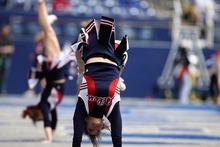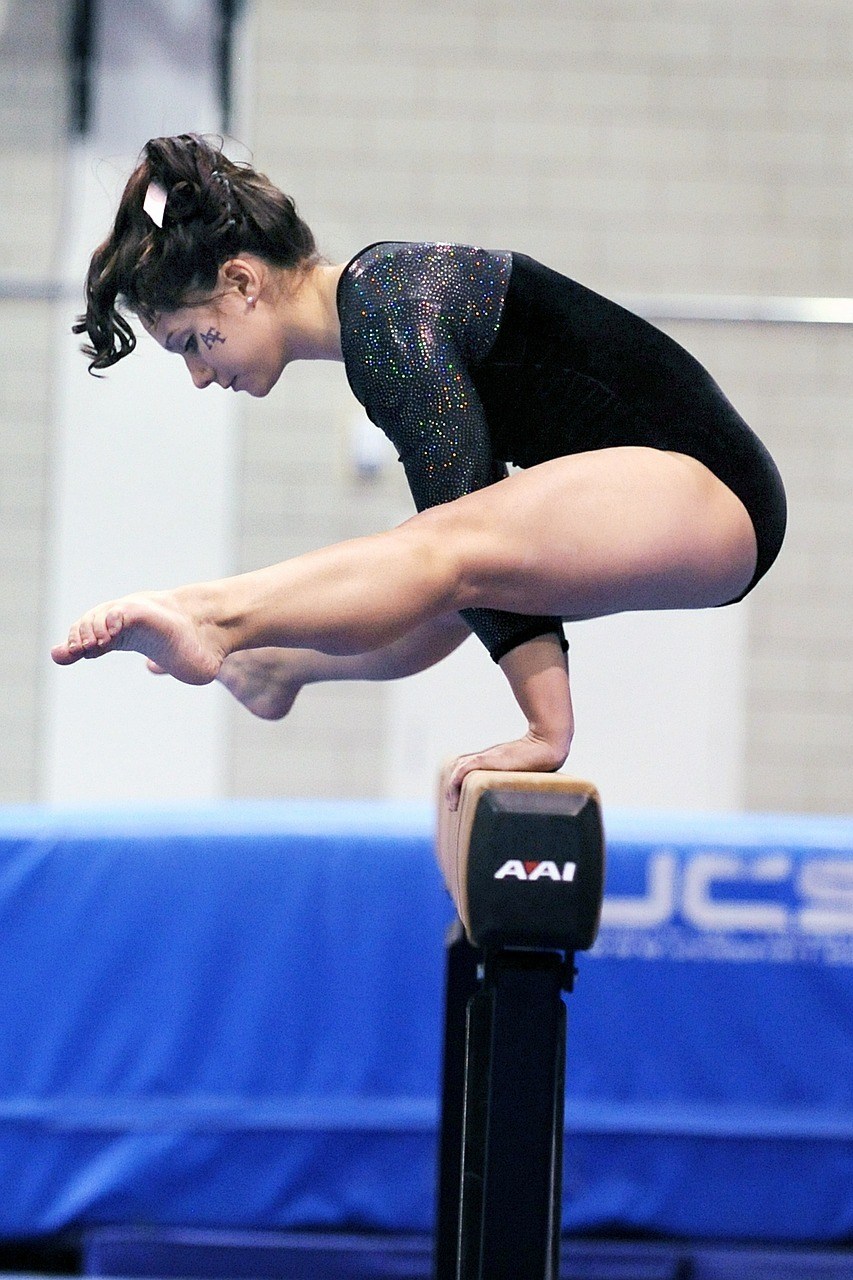Mental Blocks in Sports

 Mental blocks, tumbling blocks, balking….these are words that parents hate to even think about, let alone have to deal with. Unfortunately, developing a sudden fear of a skill is a common experience in gymnastics and cheerleading – and other sports as well.
Mental blocks, tumbling blocks, balking….these are words that parents hate to even think about, let alone have to deal with. Unfortunately, developing a sudden fear of a skill is a common experience in gymnastics and cheerleading – and other sports as well.
Jumping, releasing, tossing, flipping, going backwards on a beam, dismounts…there are a number of moves and stunts that require great skill, but can also be incredibly scary. If you have ever experienced this with your athlete, as a coach or parent, then you know how frustrating and heartbreaking it can be to witness. It can impact your child’s self-esteem, cause them to lose trust in themselves, cause them stress, and even leave them hating a sport they once loved.
Mental Blocks…But No Injury?
People usually attribute issues like this to a previous injury, but there are a number of reasons that mental blocks can occur. Even one mistake can cause mental interferences, having a lasting negative impact in an athlete’s performance going forward. The common fix that many have for fears like that are “just push through it”. While persistence and mechanics may be part of the puzzle, that alone doesn’t always fix things.
Why? Because, it leaves out the largest and most important part: the mental game.
In most cases, mental blocks happen because there is something going on in his/her head. Restoring the mental strength must be a priority. Otherwise, the interference could pop up again unexpectedly, or even transfer to other skills.
Here are some tips for helping your athlete overcome tumbling or mental blocks
Stay Positive
This is something that can be quickly forgotten. Your athlete has to know that his/her value and self-worth is not tied into their sports performance. Frustration or trying to push the athlete more and more, can just cause more interference, leading to more failure. Even a simple smile or laugh can help him/her know that there is no concern, and take some of the pressure off.
Parents….Hold Off on the Advice
This might go against the grain of what most parents do, but it can make a huge difference. Parents getting too involved can be interpreted as impatience and frustration, leading to only more mental interference. Even if what you have to say is valuable. Instead, when you are with your son or daughter, let them know they are loved and it is ok. Maybe after a day or two, then ask permission to give some feedback.
(Re)Build Confidence
Remind your athlete of all the times they have been successful! Not just in that certain skill, but in other moves, and even other areas of life. It is easy to forget how many successful moments we have had in our life. Taking a moment to consider all the little and big things we have accomplished can do wonders for overall confidence. I’ve even had some clients start a journal. In it, after every practice and competition, they write down 3 things they did well. Physically, coaches can take the skill back to step one, and slowly take them through the (re)learning process, building them back to their previous state.
Be Patient
Your son/daughter needs time to work through mental blocks. Pushing too hard now, could take away incredible potential and opportunity down the road. Be willing to see the bigger picture, and let him/her know that. Be patient with yourself as well. Many parents and coaches start putting the blame on themselves, incorrectly thinking that if they were just a better coach/trainer/mom/dad that they could get the athlete unstuck. This is rarely ever the accurate truth. Be patient! Be understanding!
Visualization
Having your son or daughter incorporate positive guided visualizations can have a big impact on their ability to get unstuck. There are many books and places online you can find ideas for visualizing. For some quick points, have him/her always go through the full process..the full move. Also, they should only visualize positive actions and outcomes. Think in details. Don’t just see the skill being performed successfully, but use all the senses. Include as many fine details as you can. Have him/her do this 3-5 times a day, including before going to bed.
Mental Coaching
The truth is there are numerous reasons that a gymnast or cheerleader could be blocking on a skill. Many times the most effective fix is working with a mental coach. Someone who can help overcome the specific mental interferences, and build back their confidence and fearlessness. If working with a trainer isn’t something you’ve thought of, it might be worth considering. There are also many books on the subject of sports psychology, mental game, tumbling blocks, etc. in gymnastics and cheerleading.
Keep this in mind: It can be overwhelming and frightening for an athlete to experience a sudden tumbling block! It usually comes with anger, embarrassment, tears, and self-doubt. As a coach or parent, it is important to show the right emotions, and give them the time and space to build back their confidence.
If you would like more information on my process and how I can help your youth athlete become fearless, let’s talk. I offer a free strategy session to simply chat and offer advice. From there, we can see if my program could be an effective answer for your athlete.
Gregg Pruett – The Mental Toughness Trainer

